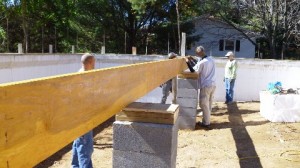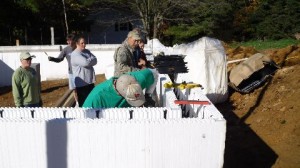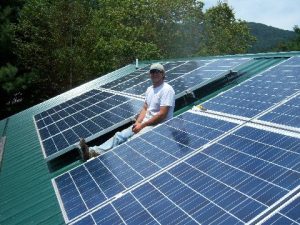
A group of volunteers for Ashe County Habitat for Humanity lays a timber frame on their first house, which was built with energy efficiency and alternative energy to lessen the burden of utility bills on people living in poverty. Photo by Gerry Tygielski.
When North Carolina’s Ashe County Habitat for Humanity formed five years ago, seven people, some who live off the grid, came together to study how to best build a home.
They made a commitment not only to affordability, but also to energy savings, and the board voted to build all Ashe County Habitat houses to maximize efficiency and place an emphasis on alternative energy.
“The benefits of energy efficiency fell into the basic requirements of the Habitat ministry,” says Gerry Tygielski, construction chairman for Ashe County Habitat for Humanity, which is founded on a “focus to eliminate poverty housing.”
To get a Habitat house, one must have an inherent need, be fiscally responsible, take part in the building process and take courses on house maintenance. The motive of Ashe County Habitat is to not only lower the cost of the mortgage, but also the cost of living in the house. Almost one in seven families in Ashe County live below the poverty line, according to the most recent census data.
“This past winter, we heard of some people having heating bills of $500 a month,” Tygielski says. “When you’re renting for another $500, that can bankrupt some people.”
The first Ashe Habitat house is a net-zero building, meaning that the energy produced by alternative energy on the house is equal to the energy used in the house. The average cost of heating and powering the house is $50 each month, says Tygielski. The second Ashe County Habitat house is currently underway and will be near, but not quite, zero net energy, due to budget constraints, but Tygielski says that they will be close since the price of solar has gone down.
The house is built with insulated concrete form, a novel construction material that uses what we commonly know as styrofoam, and has a higher insulation and fire rating than conventionally built homes with timber, insulation and drywall. It eliminates air leaks, which, on average, amounts to the air that escapes through an open window, according to the U.S. Department of Energy. Insulated concrete foam is not widely used, but it is becoming more popular for constructing basements.

A group of volunteers for Ashe County Habitat for Humanity set foam blocks into place. Concrete will be poured over the blocks to create an airtight wall. Photo by Gerry Tygielski.
High-quality storm windows also reduce air leakage, a metal roof reduces the amount of energy absorbed in the attic and solar panels provide a renewable energy source. But arguably the most efficient aspect of the house is the heating system, a geothermal heat pump. A six-foot trench, a pond or a well accesses the water table at Earth’s year-round internal temperature of 55 degrees. A compressor extracts heat from the water to heat air and pump it into the house. A conventional heat pump extracts heat from the air outdoors down to five degrees.
In northwestern North Carolina’s High Country, harsh winters are commonplace and days with temperatures below five degrees are increasing.
Conventional electric heat pumps are three times more efficient than a gas or oil furnace, Tygielski says. A geothermal heat pump is three times more efficient than an electric pump, reducing a $300-400 heating bill to $100.
“There is a premium you pay for having that opportunity, but it pays for itself so quickly that it’s a good investment,” he says. Their initial estimate says that the extra costs of making the first Ashe County Habitat house will be paid back in 10 years through lower utility bills, mainly due to greatly reduced heating costs.
This concept has a similar ring to on-bill financing, a utility-led program that provides loans for energy efficiency upgrades. The repayments, made on a homeowner’s utility bill, are structured so that they are equal to or less than the amount of energy savings resulting from the upgrades.

John Parker, an electrician who founded Parker Electric, donated his time to install solar panels on both Ashe County Habitat for Humanity’s houses. Photo by Gerry Tygielski.
Tygielski recognizes that there is a lack of public understanding about the basics of energy efficiency and that something can be done about high heating bills. Not to mention “people are busy working themselves to death to pay the bills,” he says. “They’re not in the position to be investing in home improvements.” He says an on-bill financing program gives people a chance to do something they probably would never be able to do otherwise.
In the last two years at least six people in Ashe County have been referred to Tygielski that cannot afford their utility bills. His response is to direct them to a Habitat for Humanity house application. Within a year, he may also be able to direct people to apply for an on-bill finance program offered by Blue Ridge Electric Membership Corp, an electric co-op that serves the High Country.
The electric cooperative is currently looking into on-bill finance program designs. If you are a member, please sign our letter of support to Blue Ridge Electric!



Leave a Reply